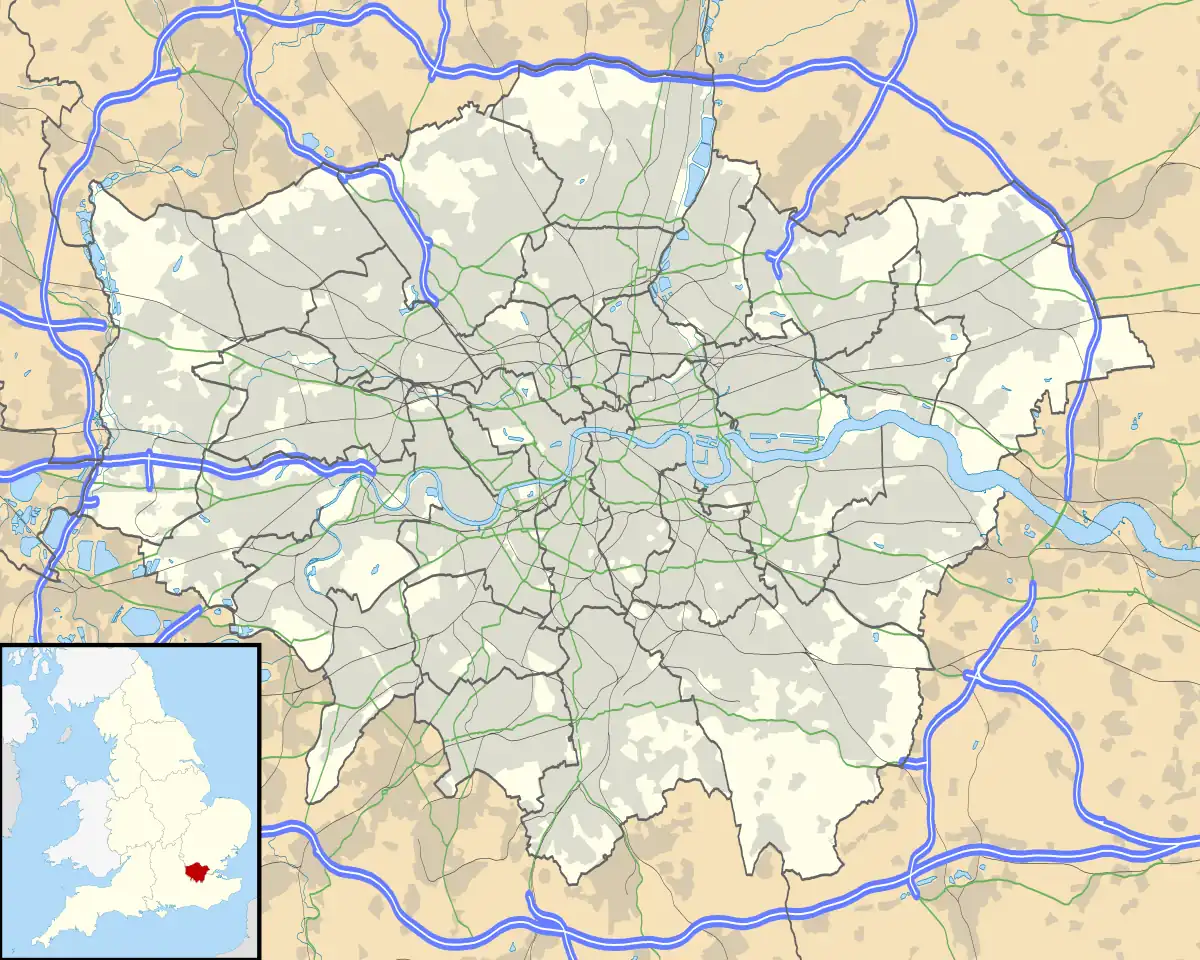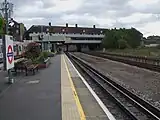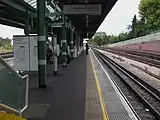| Preston Road | |
|---|---|
 Station entrance | |
 Preston Road Location of Preston Road in Greater London | |
| Location | Preston |
| Local authority | London Borough of Brent |
| Managed by | London Underground |
| Number of platforms | 2 |
| Fare zone | 4 |
| London Underground annual entry and exit | |
| 2018 | |
| 2019 | |
| 2020 | |
| 2021 | |
| 2022 | |
| Railway companies | |
| Original company | Metropolitan Railway |
| Key dates | |
| 2 August 1880 | Metropolitan Railway passes through here en route to Harrow |
| 21 May 1908 | Opened as Preston Road Halt for Uxendon and Kenton, to serve the local clay pigeon shooting site for that year's Olympic Games |
| Unknown date | Renamed Preston Road |
| 19 July 1908 | Line electrified |
| 22 November 1931 | Southbound platform resited |
| 3 January 1932 | Northbound platform resited |
| Other information | |
| External links | |
| WGS84 | 51°34′20″N 0°17′43″W / 51.57222°N 0.29528°W |
Preston Road is a London Underground station on the Metropolitan line in the London Borough of Brent. It lies between Northwick Park and Wembley Park stations and is in Travelcard Zone 4. It serves the local area of Preston in Wembley and parts of Kenton.
It is served by 'slow' (all stations) trains only (fast and semi-fast trains do not stop at stations between Wembley Park and Harrow-on-the-Hill).
History
The Metropolitan Railway was extended from Willesden Green to Harrow on 2 August 1880, but originally there were no stations between Neasden and Harrow. A station on the eastern side of the Preston Road bridge was opened on 21 May 1908, and was originally named Preston Road Halt for Uxendon and Kenton; it was later renamed Preston Road. During 1931–32, it was re-sited on the opposite side of the road bridge, and the work was carried out in two stages: the southbound platform was re-sited on 22 November 1931, and the northbound on 3 January 1932.[6][7]
Decorations

The horticultural displays on the platform have won many awards over the years, but fell into disrepair for some years. With the current refurbishment of the station the floral decorations have since been revived, providing a cheerful touch of colour and a point of interest to entertain the traveller in the wait between trains.
Services
The off-peak service in trains per hour (tph) is:[8]
- 2tph Northbound to Amersham (all stations)
- 2tph Northbound to Chesham (all stations)
- 8tph Northbound to Uxbridge (all stations)
- 4tph Northbound to Watford (all stations)
- 4tph Southbound to Baker Street (all stations)
- 12tph Southbound to Aldgate via Baker Street (all stations)
The peak time service in trains per hour (tph) is:[8]
- 2tph Northbound (morning peak only) to Amersham (all stations)
- 2pth Northbound (morning peak only) to Chesham (all stations)
- 10tph Northbound to Uxbridge (all stations)
- 4tph Southbound to Baker Street (all stations)
- 12tph Southbound to Aldgate via Baker Street (all stations)
Note that during evening peaks, services to Amersham or Chesham from Preston Road or Northwick Park require a change at Harrow-On-The-Hill.
During the morning peak (06:30 to 09:30), Fast services from Amersham and Chesham run non-stop southbound only between Moor Park, Harrow-On-The-Hill and Finchley Road whilst Semi-fast services from Watford and Uxbridge run non-stop southbound only between Harrow-On-The-Hill and Finchley Road. During the evening peak (16:30–19:30), Fast and Semi-fast services, which operate northbound only call additionally at Wembley Park.[8]
| Preceding station | Following station | |||
|---|---|---|---|---|
| Northwick Park | Metropolitan line | Wembley Park towards Baker Street or Aldgate | ||
Connections
London Buses routes 79, 204 and 223 serve the station.
Gallery
 Northbound platform looking east with an A Stock on the southbound platform. The Wembley Stadium arch is visible on the right in the background.
Northbound platform looking east with an A Stock on the southbound platform. The Wembley Stadium arch is visible on the right in the background. Southbound platform looking east. The southbound fast/semi-fast track is on the right.
Southbound platform looking east. The southbound fast/semi-fast track is on the right._(2).jpg.webp) Station platform roundel
Station platform roundel
References
- ↑ "Station Usage Data" (CSV). Usage Statistics for London Stations, 2018. Transport for London. 23 September 2020. Archived from the original on 14 January 2023. Retrieved 11 October 2023.
- ↑ "Station Usage Data" (XLSX). Usage Statistics for London Stations, 2019. Transport for London. 23 September 2020. Archived from the original on 9 November 2020. Retrieved 9 November 2020.
- ↑ "Station Usage Data" (XLSX). Usage Statistics for London Stations, 2020. Transport for London. 16 April 2021. Retrieved 1 January 2022.
- ↑ "Station Usage Data" (XLSX). Usage Statistics for London Stations, 2021. Transport for London. 12 July 2022. Retrieved 7 September 2022.
- ↑ "Station Usage Data" (XLSX). Usage Statistics for London Stations, 2022. Transport for London. 4 October 2023. Retrieved 10 October 2023.
- ↑ Butt, R.V.J. (1995). The Directory of Railway Stations. Yeovil: Patrick Stephens Ltd. p. 191. ISBN 1-85260-508-1. R508.
- ↑ Rose, Douglas (December 2007) [1980]. The London Underground: A Diagrammatic History (8th ed.). Harrow Weald: Capital Transport. ISBN 978-1-85414-315-0.
- 1 2 3 Working Timetable 340 Metropolitan Line. Transport for London. 2017. p. 4.